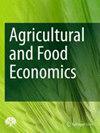Unraveling the effects of import bans on domestic poultry production: a case study of Senegal
IF 4.5
2区 经济学
Q1 AGRICULTURAL ECONOMICS & POLICY
引用次数: 0
Abstract
Abstract Senegal banned all imports of uncooked poultry meat in 2006 in response to Avian Influenza outbreaks in many exporting countries. This paper investigates the effects of the import ban on domestic chicken meat production and the performance of Senegal's broiler farms. To do so, we employ various comparative analyses at the farm and macro levels. We use the synthetic control method to estimate the effects on total production, which shows that Senegal’s chicken meat production increased more than it would have without the import ban. This may imply, in line with the infant-industry argument, that the ban has had a positive impact on chicken meat production. In addition, we use a farm-level analysis to evaluate the performance of typical Senegalese broiler farms. The comparison with Ghana shows that Senegalese farms are performing better and have lower costs of production. An opening of the markets should only be implemented gradually, by replacing the ban with tariffs because local industries must have the opportunity to adapt to the competition of the international market step by step.解除进口禁令对国内家禽生产的影响:以塞内加尔为例研究
2006年,塞内加尔为应对许多出口国爆发的禽流感疫情,禁止所有生禽肉进口。本文调查了进口禁令对国内鸡肉生产和塞内加尔肉鸡养殖场业绩的影响。为此,我们在农场和宏观层面采用了各种比较分析。我们使用综合控制方法来估计对总产量的影响,结果表明塞内加尔的鸡肉产量比没有进口禁令的情况下增加得更多。这可能意味着,与新兴产业的观点一致,禁令对鸡肉生产产生了积极影响。此外,我们使用农场层面的分析来评估典型塞内加尔肉鸡农场的表现。与加纳的比较表明,塞内加尔农场的表现更好,生产成本更低。市场的开放只能逐步实施,以关税取代禁令,因为当地工业必须有机会逐步适应国际市场的竞争。
本文章由计算机程序翻译,如有差异,请以英文原文为准。
求助全文
约1分钟内获得全文
求助全文
来源期刊

Agricultural and Food Economics
Agricultural and Biological Sciences-Agricultural and Biological Sciences (miscellaneous)
CiteScore
5.50
自引率
5.10%
发文量
29
审稿时长
13 weeks
期刊介绍:
Agricultural and Food Economics (AFE) is an international peer-reviewed and open access journal published on behalf of the Italian Society of Agricultural Economics. AFE welcomes research articles from economists, scholars and researchers from all over the world to publish problem-oriented and high-quality articles. AFE publishes only original articles from a wide variety of economic perspectives that address current and relevant issues related to the agricultural and food system. AFE publishes articles focused on applied analysis, the discussion of innovative results, and relevant policy and managerial implications. AFE seeks clearly written articles from experts in the field, to promote insightful understanding of the current trends in the agri-food system. Topics of specific interest to AFE include agricultural and food market analysis, agri-food firm management and marketing, organization of the agri-food chains, consumer behavior, food quality and safety issues, economics of nutrition and food security, food and health economics, agri-food policy and trade, sustainable rural development, natural and marine resource economics and land economics.
 求助内容:
求助内容: 应助结果提醒方式:
应助结果提醒方式:


